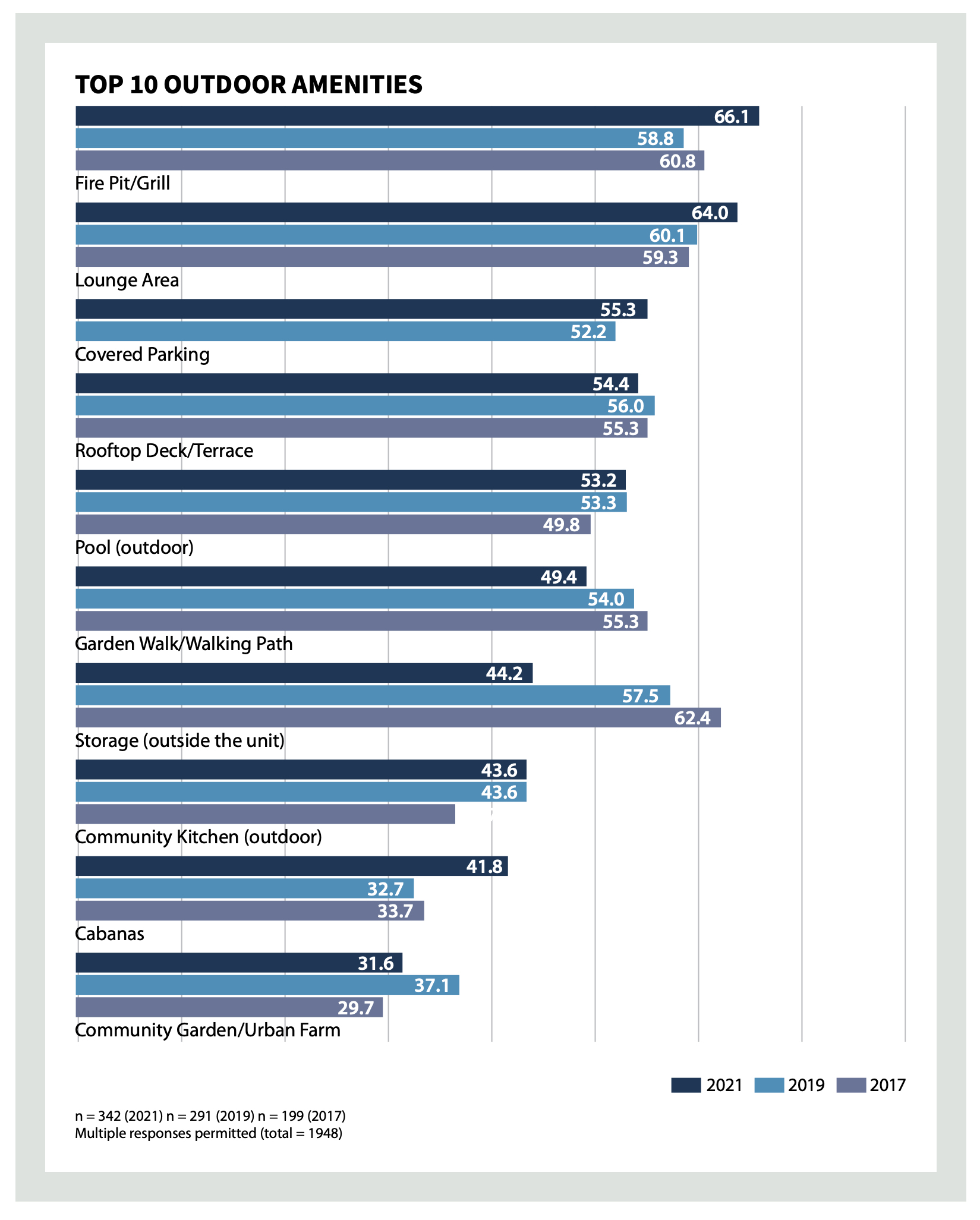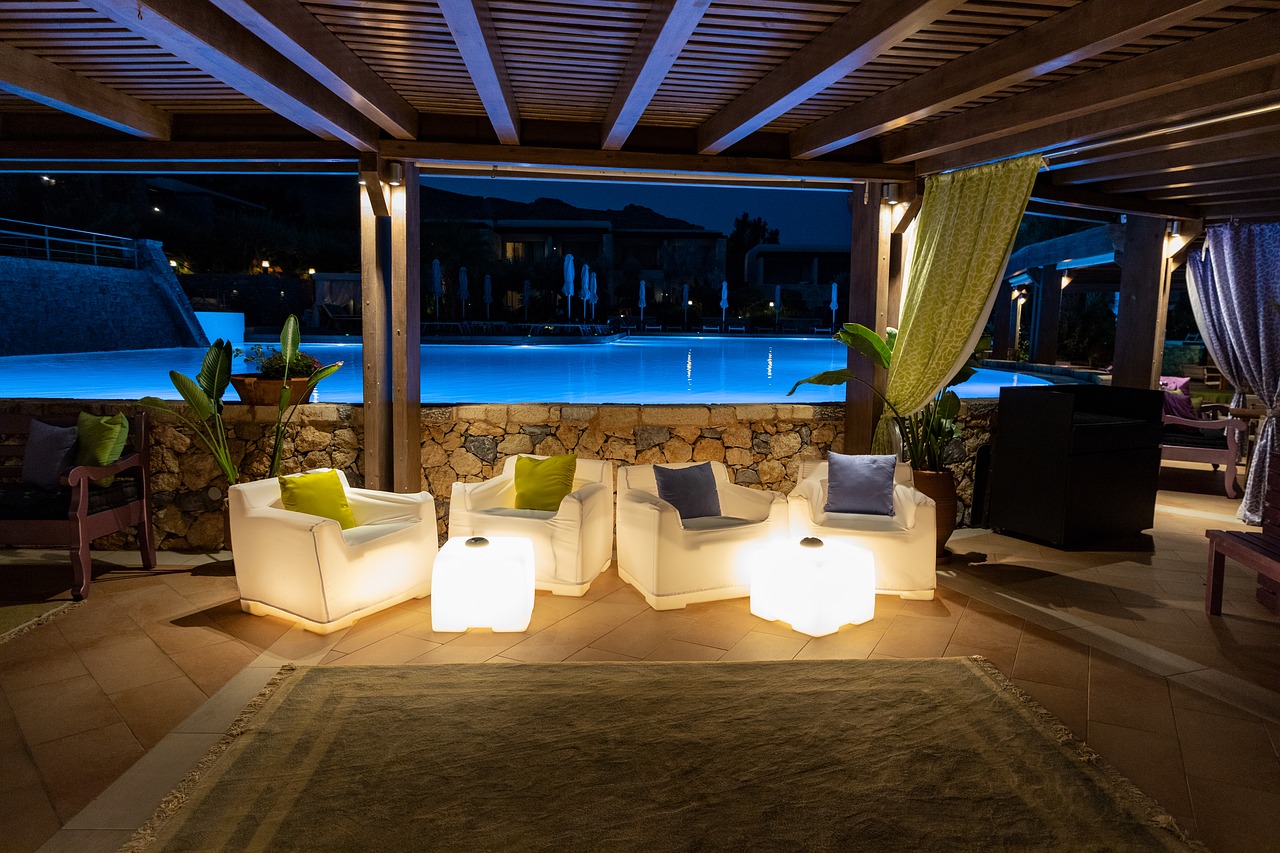For multifamily developers, and their building teams, getting the amenities mix right could make or break the success of their multifamily housing developments.
Ongoing research by BD+C's sister brand, Multifamily Design+Construction (MFDC), aims to help developers, owners, architects, and other project team members identify proven and trending multifamily amenities.
The latest iteration of MFDC's research, the 2021 Multifamily Amenities Study, ranks the top 131 amenities that developers are providing in today's apartment and condominium communities. A total of 342 industry professionals completed the online, 11-question survey over a four-week period in February/March 2021.
The makeup of respondents includes architects/interior designers (34.9 percent), developers/owners/property managers (30.5 percent), construction professionals (21.4 percent), consultants (5.0 percent), engineers (3.2 percent), and others allied to the multifamily housing field (5.1 percent).
Thanks to our 2021 Multifamily Amenities Study sponsor: EXACOR™ | Huber Engineered Woods
Top 10 outdoor amenities at multifamily housing developments
Among the findings from the 2021 Multifamily Amenities Study is a ranking of the top 10 outdoor amenities.
Fire pits (66.1 percent), lounge areas (64.0 percent), and covered parking (55.3 percent) were cited most often by survey respondents, followed by rooftop deck/terrace (54.4 percent), outdoor pool (53.2 percent), and walking paths (49.4 percent). Outdoor kitchens (43.6%) and community gardens (31.6%) are also popular items.
Looking at historical data from the 2019 and 2017 Multifamily Amenities surveys, almost all outdoor amenities tracked closely with the 2021 report. Although “storage (outside the unit)” seems to have dropped off significantly, at 44.2% this year, vs. 57.5% in 2019 and 62.4% in 2017.

Nearly one-fourth of respondents (24.6 percent) had installed a Jacuzzi, up slightly from 2019 (20.6 percent).
Outdoor movie screens (15.8 percent, vs. 14.4 percent in 2019) and catering pantries (12.9 percent, up a touch from 11.7 percent in 2019) also made the list.
The 2021 Multifamily Amenities Study ranks amenities and features across nine other building areas:
• Top ‘smart connectivity’ systems
• Top 10 indoor amenities
• Top 10 recreation amenities
• Top 10 convenience services
• Top 10 quality of life amenities
• Top 10 business and technology services
• Top 10 security services
• Top children's services
• Top services for pets
• BONUS: COVID-19 impact on amenities
• BONUS: List of ‘first-time amenities’ for developers
Download the complete findings for free (short registration required).
Related Stories
MFPRO+ News | Jun 3, 2024
Seattle mayor wants to scale back energy code to spur more housing construction
Seattle’s mayor recently proposed that the city scale back a scheduled revamping of its building energy code to help boost housing production. The proposal would halt an update to the city’s multifamily and commercial building energy code that is scheduled to take effect later this year.
Resiliency | Jun 3, 2024
Houston’s buyout program has prevented flood damage but many more homes at risk
Recent flooding in Houston has increased focus on a 30-year-old program to buy out some of the area’s most vulnerable homes. Storms dropped 23 inches of rain on parts of southeast Texas, leading to thousands of homes being flooded in low-lying neighborhoods around Houston.
MFPRO+ New Projects | May 29, 2024
Two San Francisco multifamily high rises install onsite water recycling systems
Two high-rise apartment buildings in San Francisco have installed onsite water recycling systems that will reuse a total of 3.9 million gallons of wastewater annually. The recycled water will be used for toilet flushing, cooling towers, and landscape irrigation to significantly reduce water usage in both buildings.
MFPRO+ News | May 28, 2024
ENERGY STAR NextGen Certification for New Homes and Apartments launched
The U.S. Environmental Protection Agency recently launched ENERGY STAR NextGen Certified Homes and Apartments, a voluntary certification program for new residential buildings. The program will increase national energy and emissions savings by accelerating the building industry’s adoption of advanced, energy-efficient technologies, according to an EPA news release.
MFPRO+ News | May 24, 2024
Austin, Texas, outlaws windowless bedrooms
Austin, Texas will no longer allow developers to build windowless bedrooms. For at least two decades, the city had permitted developers to build thousands of windowless bedrooms.
Mass Timber | May 22, 2024
3 mass timber architecture innovations
As mass timber construction evolves from the first decade of projects, we're finding an increasing variety of mass timber solutions. Here are three primary examples.
Mixed-Use | May 22, 2024
Multifamily properties above ground-floor grocers continue to see positive rental premiums
Optimizing land usage is becoming an even bigger priority for developers. In some city centers, many large grocery stores sprawl across valuable land.
MFPRO+ News | May 21, 2024
Massachusetts governor launches advocacy group to push for more housing
Massachusetts’ Gov. Maura Healey and Lt. Gov. Kim Driscoll have taken the unusual step of setting up a nonprofit to advocate for pro-housing efforts at the local level. One Commonwealth Inc., will work to provide political and financial support for local housing initiatives, a key pillar of the governor’s agenda.
MFPRO+ News | May 21, 2024
Baker Barrios Architects announces new leadership roles for multifamily, healthcare design
Baker Barrios Architects announced two new additions to its leadership: Chris Powers, RA, AIA, NCARB, EDAC, as Associate Principal and Director (Healthcare); and Mark Kluemper, AIA, NCARB, as Associate Principal and Technical Director (Multifamily).
MFPRO+ News | May 20, 2024
Florida condo market roiled by structural safety standards law
A Florida law enacted after the Surfside condo tower collapse is causing turmoil in the condominium market. The law, which requires buildings to meet certain structural safety standards, is forcing condo associations to assess hefty fees to make repairs on older properties. In some cases, the cost per unit runs into six figures.


















